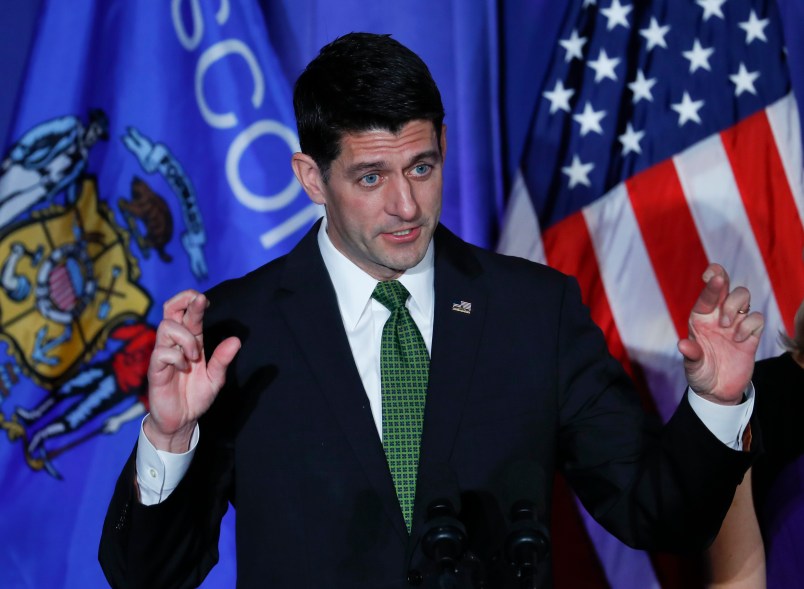Almost none of the Obamacare taxes survive in the repeal legislation that the GOP congressional leadership is pushing. But the one Obamacare tax that Republicans do retain — though it is delayed for almost a decade — is a surprising candidate. The legislation includes an implementation in 2025 of the widely loathed Cadillac tax, which imposes a 40 percent levy on the most generous of employer health insurance plans.
House Speaker Paul Ryan’s “Better Way” agenda called the Cadillac tax “controversial,” while the the head of the conservative political organization Heritage Action once described it as a “political nightmare of epic proportions.”
It’s not that GOP lawmakers are suddenly warming to the tax, however, even as it has long been praised by health care policy wonks across the idealogical spectrum. Rather Republicans are using it to smooth over the budget math: Their bill not must add to the deficit in the long term in order to be eligible for the complicated legislative process in the Senate that they’re using to repeal Obamacare.
“It’s just another budget slight of hand, and it’s about as hypocritical as you could possibly get,” Stan Collender, a federal budget expert and executive vice president at Qorvis MSL Group, told TPM.
The idea goes like this: Republicans are counting on a legislative process called reconciliation to get their repeal bill through the Senate, because using the maneuver requires only a majority vote and thus avoids a Democratic filibuster. A Senate rule known as the Byrd Rule requires that legislation passed through reconciliation not add to the deficit, when measured after the ten-year window following its passage.
“The answer must be that they need the revenues that the Cadillac tax offers to cover the 10-year costs” said Richard Kogan, a former senior adviser at the Office of Management and Budget who is now at the left-leaning Center on Budget and Policy Priorities.
A House GOP aide more or less confirmed that the reconciliation rules were the reason they included the tax in the legislation.
“We are fully repealing the Cadillac Tax until 2025 to comply with Senate budget rules,” the aide said in an email to TPM. “Throughout this process, we will work to repeal the Cadillac Tax permanently to ensure this punitive tax never goes into effect.”
In general, the problem for Republicans is that their Obamacare replacement bill closes off most avenues of revenue that fund its benefits, including the ACA’s tax on individuals making more than $200,000 and a tax on net investment income, which altogether brought in $346 billion over 10 years. Both of those taxes, and various taxes on the health care industry, are repealed under the GOP plan.
But Republicans still plan to offer some form of assistance in their replacement, in the form of advanceable tax credits for individuals to use on insurance, though those subsidies are less generous than the ACA’s. The massive cuts GOP lawmakers are planning for Medicaid might cover some of the revenue losses. How much those cuts will cover won’t be known until the Congressional Budget Office returns its score of how all the costs and funding shakes out.
Tacking on the Cadillac tax on the end of the 10-year scoring period “takes some of the edge off,” said Joe Antos, a health care policy expert at the conservative American Enterprise Institute.
“It solves part of the scoring problem, I don’t think it solves all the scoring problem,” Antos said. Alongside the inclusion of the tax, he pointed to a page posted by House leadership where Republicans said they were “still discussing details” of how to pay for their replacement.
“Which means they know they have a problem,” Antos said.
There is, of course, some irony in Republicans turning to a tax they hate to grease the wheels of their repeal effort and there’s reason to believe GOP lawmakers may try to nix the tax entirely before the bill makes it to the President’s desk. The 2015 bill they voted on to repeal the Affordable Care that was vetoed by then-President Obama also originally held onto the Cadillac tax. Senators voted to strip the provision before passing the final bill.
It’s unclear whether, if Republicans try that move again, Democrats will attempt to invoke a point of order, a procedural maneuver to declare the bill in violation of Senate rules. But even if the tax makes it into law, it probably won’t survive through 2025. It was repeatedly delayed under the Obama administration, as many Democrats oppose it as well.
“It’s been put off by the Obama administration, and it will be put off by who is in charge then,” Antos said.







The Medicaid cuts are likely to be more significant in the final tall but Republicans love those.
Edited to add a comment on this:
So they’re saving the Cadillac Tax specifically to get a favorable ruling on the budget impact but then announcing that they’ll permanently kill the Cadillac Tax after that. Isn’t that, oh, I don’t know, fraud or something?
But wait, they’re always telling us Byrd was a former KKK member, so why are they using his rule to finesse their messy budget math?
Factio Republicane delenda est
No - it’s far worse than that I think - although it made no sense to me, I thought the story said that they were
killing it now but then will bring it back in 2025 (but not really because they think they finagle out of it).